"The Influences of the Civil Code on Human Resource Management" Blue Book Launch Conference and High-end Forum Held
Date:2020-11-04
On the afternoon of October 23, "The Influences of the Civil Code on Human Resource Management" Blue Book Launch Conference and High-end Forum organized by the Institute of Labor Law and Social Security Law of Peking University, the Employer Work Department of the China Enterprise Confederation, and River Delta Law Firm was held in Beijing. This forum attracted many experts and representatives from the political, academic, practical, and business circles from the fields of labor law and human resource management to participate. Professor Ye Jingyi, vice president and secretary general of the China Social Law of China Law Society, and director of the Institute of Labor Law and Social Security Law of Peking University, attended the forum. Associate Professor Jin Jinping, deputy director of the Institute of Labor and Social Security Law of Peking University, and Yan Tian, assistant professor of Peking University Law School attended the forum. The opening ceremony of the forum was hosted by Professor Ye Jingyi.
Professor Ye Jingyi first welcomed all guests to attend the forum. Combined with the promulgation of the Civil Code, she elaborated on the dialectical relationship between the Civil Code and Labor Law from the perspective of departmental law. On the one hand, the division of departmental laws has scientific basis and practical significance. It is necessary to clarify the differences and distinctions between the Civil Code and Labor Law in terms of adjustment objects, adjustment methods, and value pursuits; on the other hand, the integration and coordination of departmental laws is an important phenomenon in the practice of the contemporary rule of law, which have a run-though connection between the Civil Code and Labor Law at the practical and theoretical levels. The promulgation of the Civil Code will surely promote a more full and effective interaction between the Civil Code and Labor Law, and will surely be conducive to the extension of the toils of law and the construction of harmonious labor relations. The promulgation of the Civil Code definitely does not mean the so-called "civil advancement, labor retreat" and the decline of labor law status, but opens up a broad prospect for mutual promotion and common development of the Civil Code and Labor Law.
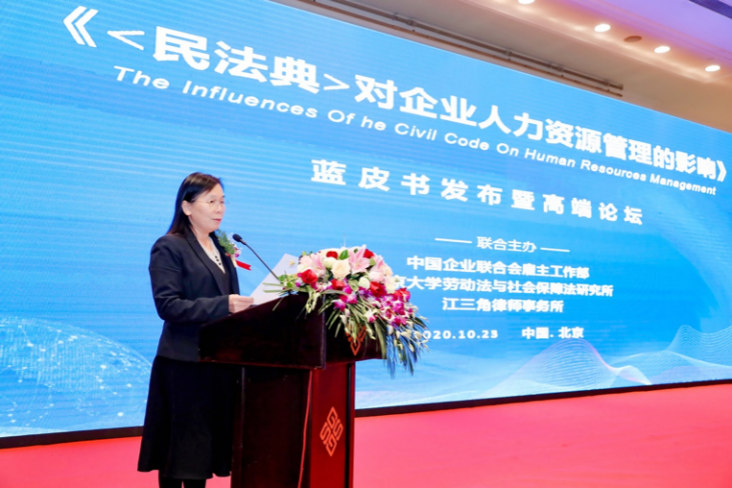
Professor Ye Jingyi presided over the opening ceremony
Afterwards, Zhang Wentao, director of the Employer Work Department of the China Enterprise Confederation, member and deputy office director of the Tripartite Conference on National Coordination of Labor Relations, represented the organizer, and Li Jun, deputy director of the Department of Labor Relations, Ministry of Human Resources and Social Security, and deputy office director of the Tripartite Conference on National Coordination of Labor Relations, represented the competent authority, delivered speeches respectively. They stated that the promulgation and implementation of the Civil Code will not only facilitate the implementation of the Labor Law, but also create corresponding challenges to the Labor Law. On this basis, it is necessary to promote the continuous improvement of labor security laws and regulations.
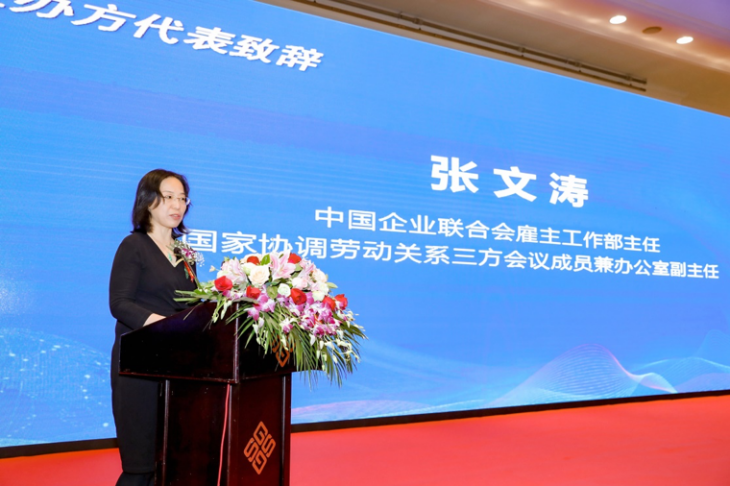
Zhang Wentao, director of the Employer Work Department of the China Enterprise Confederation, member and deputy office director of the Tripartite Conference on National Coordination of Labor Relations, delivered a speech on behalf of the organizer
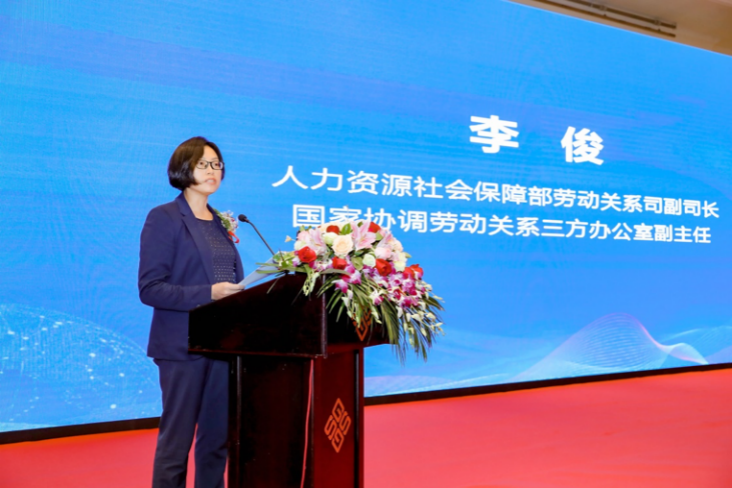
Li Jun, deputy director of the Department of Labor Relations, Ministry of Human Resources and Social Security, and deputy office director of the Tripartite Conference on National Coordination of Labor Relations, delivered a speech on behalf of the competent authority
After the speeches, Associate Professor Jin Jinping and Assistant Professor Yan Tian, as representatives of the Institute of Labor Law and Social Security Law of Peking University, together with Professor Ye Jingyi and representatives of other producers, released the blue book "The Influences of the Civil Code on Human Resource Management". The blue book has eight chapters, focusing on the impact of the code on human resource management, covering seven aspects: employee entry management, salary and post management, special employee management, employee personality protection, corporate rights protection, employee resignation management, and labor dispute management, which has important reference value for improving corporate management skills and enhancing corporate legal awareness.
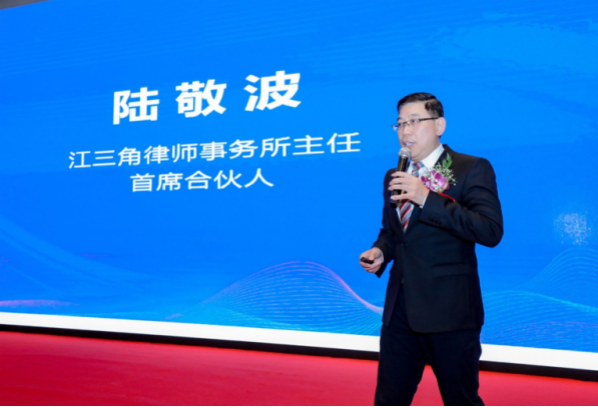
Lu Jingbo, Director and Chief Partner of River Triangle Law Firm, introduced the content of the Blue Book
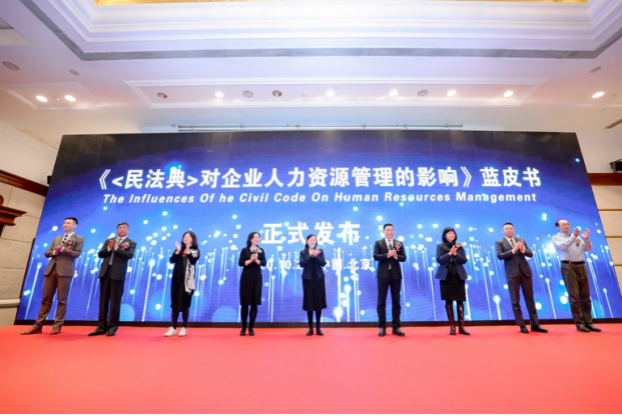
Representatives of each producer jointly released the blue book
After that, the forum entered the topic speech session. Experts, scholars, and practitioners shared their research results and practical experience on hot issues such as flexible employment, salary and position adjustment, reputation protection, and employee job behavior after the promulgation of the Civil Code. In the subsequent round table discussion session, relevant guests discussed "employees' personal ethics and behaviors and the termination of labor contracts", and the atmosphere was lively.
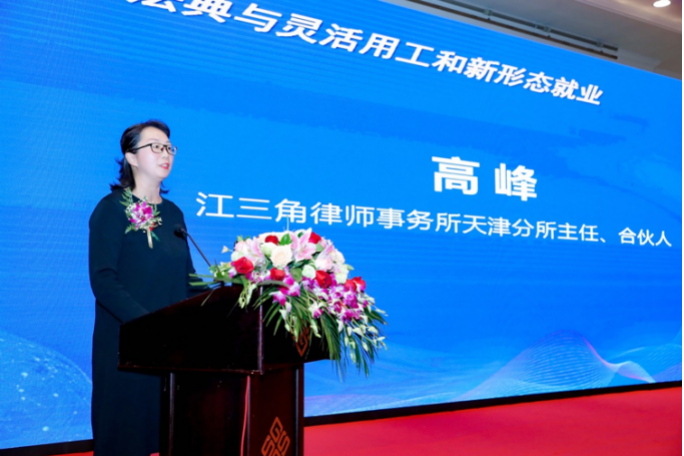
Gao Feng, director and partner of the Tianjin branch of River Triangle Law Firm, gave a keynote speech on "Code and Flexible Employment and New Forms of Employment"

Xie Zengyi, researcher and director of the Foreign Affairs Research Office of the Institute of Law, Chinese Academy of Social Sciences, delivered a keynote speech on "Civil Code and the Protection of Employee Privacy and Personal Information"
Finally, professor Wang Quanxing, the vice president of the China Social Law of China Law Society, the vice president of the China Economic Law of China Law Society, and professor from School of Law, Shanghai University of Finance and Economics, made concluding remarks for this forum. He said that although the Civil Code leaves a cohesive mechanism for applying other laws, it increases the risk of weakening the safety of the labor market. Efforts should be made to realize the two laws moving towards each other, with “labor law thinking + civil law thinking”, and achieving both laws. So far, the "The Influences of the Civil Code on Human Resource Management Blue Book Release Conference and High-end Forum" has been successfully concluded.
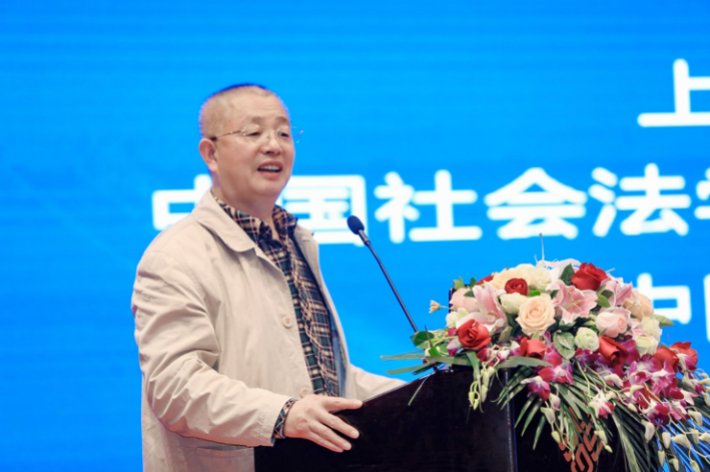
Professor Wang Quanxing, the vice president of the China Social Law of China Law Society, the vice president of the China Economic Law of China Law Society, and professor from School of Law, Shanghai University of Finance and Economics, made concluding remarks for this forum.
Translated by Zhou Lu
Edited by Shan Baowei



